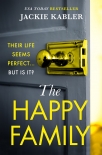The Happy Family, Jackie Kabler [most inspirational books .TXT] 📗

- Author: Jackie Kabler
Book online «The Happy Family, Jackie Kabler [most inspirational books .TXT] 📗». Author Jackie Kabler
I poke my right thigh and the flesh wobbles. Not so firm, then. My eyes move upwards to my stomach and my bum. Once (before children and, latterly, the comfort eating that came with divorce) flat and smooth, my tummy now has rolls of fat I can lift with both hands; when I drive over a speed-bump in the car, I can actually feel it bouncing up and down. And as for the rear view … I turn my back to the mirror and peer over my shoulder at my bottom. Once high and pert, now it sags, the blubbery, untoned cheeks merging with the tops of my thighs. I stare at it, feeling disgusted. How have I let this happen? And why am I only feeling like this now? Yes, like almost every woman I know, I moan about my body all the time, batting off any compliments and vowing to lose a stone after Christmas/for the summer/before my next birthday, because that’s what we do, isn’t it? But actually, I’ve embraced my new curvier form of recent years, quite enjoying my larger breasts and the soft curve of my shoulders, so different from the thinner, flat-chested, bonier me of my twenties. I’m not sure what’s changed, why I’m suddenly starting to feel so … so revolted by my own appearance. And yet …
I run my hands over my breasts, lifting each one up in turn, enjoying the weight of them. The nipples are pink and harden slightly in the coolness of the room. Yes, my boobs are still good, I think. That’s something, at least. I stand there a little while longer, lost in thought, my hands idly caressing my breasts, my stomach, the tops of my thighs. Then, abruptly, I turn away from the mirror, pull my pyjamas on, and crawl into bed. I’m exhausted, but sleep doesn’t come. My mind is racing, filled with thoughts of Brenda and Barbara, the women I thought were my friends but clearly, clearly weren’t. And then I remember the panic I felt when Mum started to tell me what they’d said, and I’d thought for a dreadful moment that she was going to say something completely different, that she was going to tell me that they’d told her something about me, something they’ve only just discovered. I think about the fear that gripped me, the fear that’s spiralled in the past few weeks. I think about the terror that one day the past I’ve tried so hard to forget is going to come back and ruin my present and destroy my future. The horrific thought of my friends, my colleagues, finding out what I did, what I am. I’m just so scared, I realise. So very, very scared. If Mike is still hanging around, if he has uncovered it, if he’s told Mum, told anyone …
I take a deep, shuddering breath, my hands gripping the duvet, my eyes wide and frightened in the dark.
If he has told her though, wouldn’t she have mentioned it to me by now? And if he hasn’t told her, then why on earth would he tell anyone else? He wouldn’t; of course he wouldn’t. Could Mum know about it another way though? From somebody else? I need to know if she knows, or I’m going to drive myself mad. I need to find out, somehow, and I need to do it fast, because I can’t go on like this. I can’t.
It won’t stop the nightmares though. Nothing, I think, will ever stop the nightmares.
Chapter 16
That first day, when I sat next to Lucy Allen in class, I barely acknowledged her. I was pissed off that the teacher, hoping for a quiet lesson, hadn’t let me sit with my usual noisy gang, putting me instead with this dull little girl who blushed every time she was asked a question but still always knew the answer.
‘Swot,’ I thought viciously.
I was different then, you see, to how I am now. Now I’ve learned tolerance and patience, kindness. But then, when I was thirteen, puberty was kicking in and the pain of the loss of my mother was even more acute; the anguish and anger burned more fiercely inside me every day and I was, quite frankly, a little bitch. Now I know that the way I behaved back then was completely normal for someone who had experienced what I had; I had friends, girls I hung out with, but I fell out with them regularly, always pushing them away before we got too close. I had begun more and more to believe, even though my dad told me repeatedly that he loved me, that I was not worthy of love, that I was defective somehow, because why else would my mother leave me? Increasingly, I struggled to cope with any form of criticism, or the tiniest hint of rejection – even a dog bounding up to one of my friends in the park and ignoring me was enough to send me descending into a depression that would last for days and yet was impossible for me to understand or explain. Therapy, although I fought it and refused to go as a teenager, was what saved me in the end. At university, I finally realised I needed help, and the resultant year of regular sessions with a gentle soul called Rita finally taught me that it was safe to put down roots, that it was possible to work through issues with friends and partners instead of shutting down and walking away. That I didn’t have to be so fiercely independent but could actually let





Comments (0)